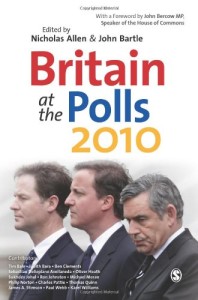Britain at the Polls: four parts standard fare to five parts novel analysis
 The rise of online political coverage has done no harm to the mini-publishing boom brought about by a general election. In addition to the one-off books and the relatively new series there are some long running series that churn out a new edition for every general election.
The rise of online political coverage has done no harm to the mini-publishing boom brought about by a general election. In addition to the one-off books and the relatively new series there are some long running series that churn out a new edition for every general election.
The Nuffield series is the most famous and longest-running but the Britain at the Polls series is a worthy and complementary series. Its latest offering, Britain at the Polls 2010 (edited by Nicholas Allen and John Bartle), provides something extra even in the face of the latest Nuffield offering, The British General Election of 2010, which revived and expanding a format that had got a little stale.
Allen and Bartle’s volume falls into two segments – four chapters on the history of each of the main parties over the last election and then the coalition negotiations mixed in with five chapters on longer-term explanations for why the election result turned out the way it did.
The former segment contains well-written, but unexceptional, chapters. There is no shortage of accounts of the parties and the coalition talks and these four chapters, whilst done well, have little to distinguish themselves from the many other good alternative accounts available elsewhere save for the provision of some slightly different and interesting statistical information such as the details of how Labour MPs became more rebellious in 1997-2010.
Reading the footnotes on the Liberal Democrat chapter suggests that it will have rather more to distinguish itself, for the authors interviewed a good range of senior party figures, and the presence of a diagram in the chapter that rightly highlights the usually neglected power of the Federal Conference Committee is a promising sign. However, it does not fully live up to these promising signs, with at times a rather superficial description of the party, especially when it comes to the circumstances of Paddy Ashdown’s resignation in 1999 and the reasons why the party became happy with the concept of a formal coalition (experiences in Scotland, Wales and local government were important but are all but ignored in the chapter).
Regrettably too the chapter makes no attempt to reconcile its story of a right-ward shift in the party in 2005-2010 with the data presented elsewhere in the book that shows, based on a content analysis, that the party’s 2005 manifesto was its most right-wing for many years and that the 2010 manifesto was in fact a shift to the left, being more left-wing than not only the 2005 manifesto but also the 2001 manifesto.
The book’s other segment more than makes-up for these limitations with chapters on the economy (nicely dissecting the fragile foundations to the long Labour boom), the impact of MPs expenses (concluding that the big long term trend in political disengagement is far more down to an increasingly isolated political class than social changes or the ways in which the media covers politics), the changing public mood (showing that the public’s views tend to move counter to that of the party in power – going left under a Conservative government and moving right under a Labour government), the impact of the TV debates and the impact of target seat campaigning (targeted extra activity brought benefits for the Conservatives against Labour but much less so against the Liberal Democrats, while incumbents of all parties generally did much better than new candidates).
These five chapters provide much analysis that is new even to a reader who has already read all the other election books, making this a title well worth reading.
If you like this, you might also be interested in The British General Election of 2010.
Got a view on this review? Then please rate it on Amazon.
Buy Britain at the Polls 2010 (edited by Nicholas Allen and John Bartle) here.
Leave a Reply